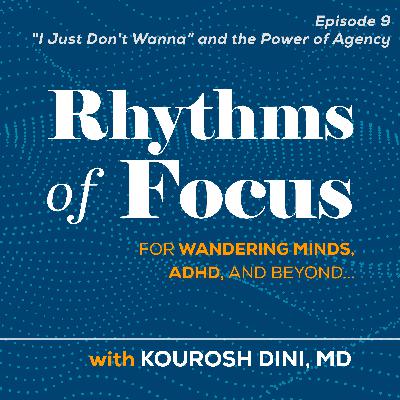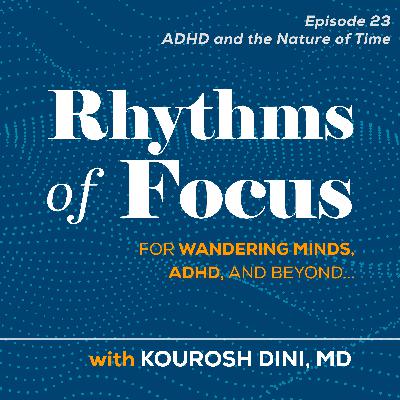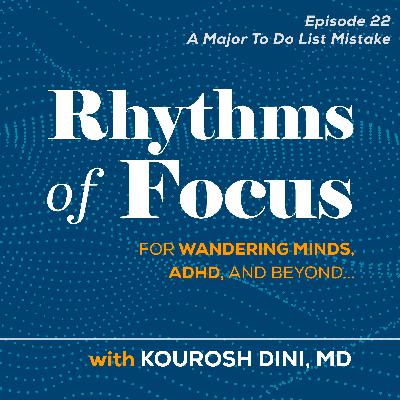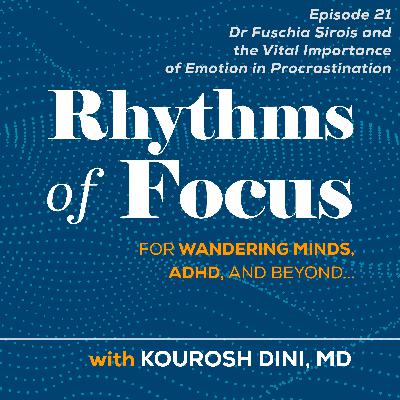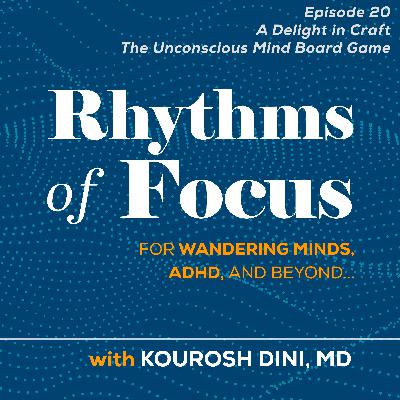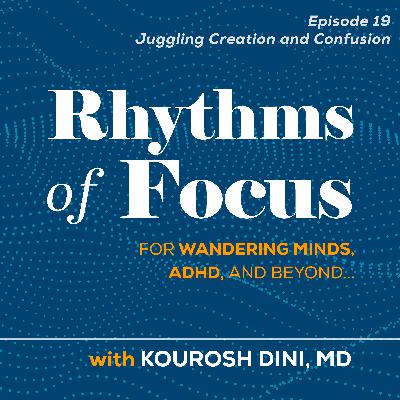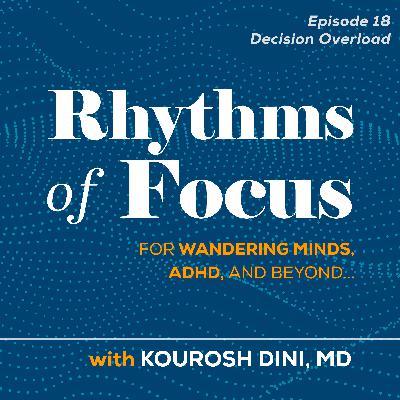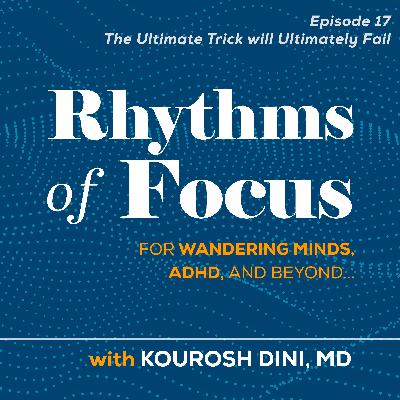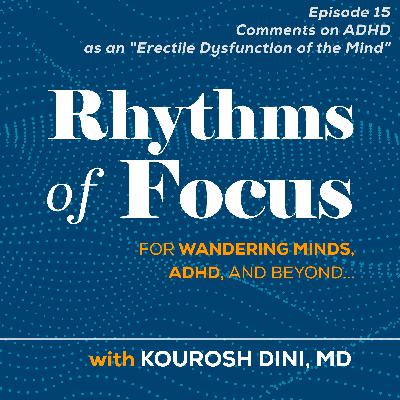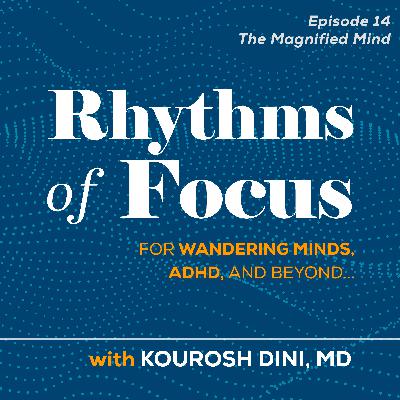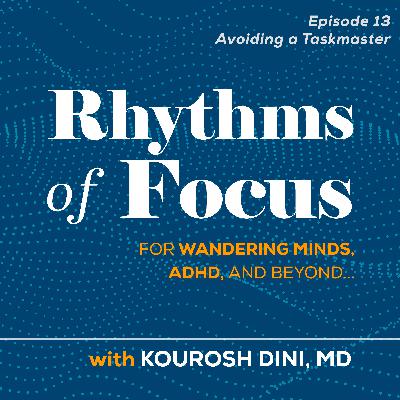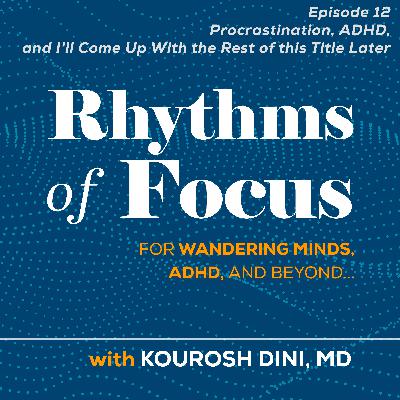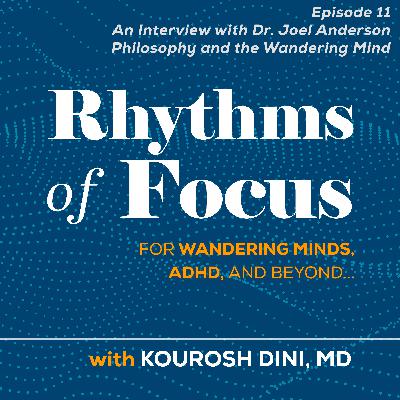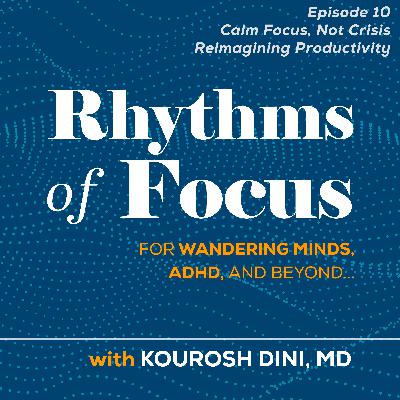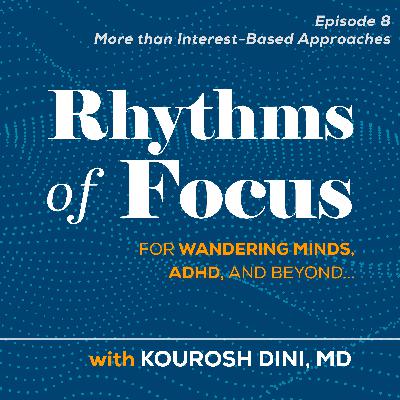"I Just Don't Wanna" and the Power of Agency
Description
Feeling trapped by rigid productivity hacks or the pressure to “just start”? This episode of Rhythms of Focus invites you to reimagine focus—not as a battle of willpower, but as a gentle practice of agency.
For adults with ADHD and wandering minds, agency is the skill of deciding and engaging non-reactively, even when emotions or distractions surge like waves. Instead of forcing yourself forward, you’ll discover how to nurture a sense of agency that honors your rhythms and restores trust in your own choices.
In this episode, you’ll learn:
- Why agency—not force—is the missing ingredient for meaningful productivity and self-trust
- How to move from shame-based or deadline-driven habits to a visit-based approach that supports your creative mind
- Practical ways to pause, sense your options, and make decisions that feel true to you
Key takeaways
- Practice “visits” instead of forcing action, building agency one gentle step at a time
- Use mindful pauses to transform overwhelm into clarity and choice
- Reframe “I don’t wanna” moments as signals to honor your agency, not shame yourself
Enjoy an original piano composition, Wind at Play, highlighting the practice between play and agency.
Subscribe to Rhythms of Focus and visit rhythmsoffocus.com for more resources, support, and inspiration designed for creative, wandering minds.
Keywords
#ADHD, #WanderingMinds, #agency, #gentleproductivity, #mindfulfocus, #visitbasedproductivity, #selftrust, #creativity, #selfcompassion, #rhythmsoffocus
Links
- Episode S01E04 - From Force to Flow with a Visit
- Episode S01E07 - Cautions of Dopamine and a Lean into Mastery
- “I just don’t wanna” and the Power of a Visit - Neurodivergent Insights
- What’s the Difference Between PDA and Demand Avoidance? - Neurodivergent Insights
Transcript
"I just don't wanna,"
it's a familiar refrain for those with wandering minds. So what do we do when we just don't wanna.
Agency, Not Force, Unlocks Gentle Productivity
You may well know that once you're in it, you're good to go, but getting there can be terribly difficult. Yelling, "just start" hardly works. And when it does, it carries this host of troubles.
In earlier episodes, I talked about dopamine and the "interest-based nervous system" as it's been called, and how we might use these ideas against ourselves to say that we need some chemical or preexisting emotion to get to work. We adopt a sense that we cannot work by our own will.
But I did also hint at a third point of view.
We often focus on attention. For example, one type of wandering mind often carries such a diagnosis. ADHD. It's right there in the title, right? Attention Deficit hyperactivity Disorder. And there's even the inattentive type where we say that is the main focus.
But what's profoundly missing from the title and other wandering minds, such as the anxious, the creative, the absent-minded, and the like, is the sense of agency.
Now, what is that? It sounds simple. Maybe boring. Why bother with such an abstract idea? What does agency have to do with anything?
This central idea is a pillar to everything I write about, how I function as a psychoanalyst, and how I function as a teacher.
If you want to know the secret to what makes me stand out as a productivity talking head, I believe it comes from this focus on supporting our sense of agency and not about doing things.
So I hope you'll indulge me for a moment as we take this concept apart because I strongly believe that this not so simple skill is a trellis that supports so much, if not all, meaningful growth.
Deciding Without Drama: The Skill of Agency
Now, what do I mean by agency? Here's the definition.
Agency is the skill and degree to which we can decide and engage non-reactivity.
Let me repeat that definition: agency is the skill and degree to which we can decide and engage non-reactivity.
Alright, so let's take that apart and see what we get. Hopefully. I'll be able to convey what is so vital about this.
When I use the phrase "non-reactive", that's the end of the sentence there, that deciding and engage non-reactively, it means that we can sense our world within us, that emotional, thoughtful world without being swept away.
It is far too easy and maybe even the default to be carried by these waves. When we catch ourselves in the middle of an email, not realizing how we even got there, we're reactive. When we worry and can't decide on something, we're reactive to that worry. When we flip off that person that almost ran us off the road, were reactive to that anger.
Our interests, wants, needs, impulses, worries, and cares- they all touch, wash over, if not crash into us as waves. But when we can sense these emotions, these feelings, these thoughts to whatever degree we can and begin seeing them as information, we start to recognize the options they represent. Hearing that information, these messengers from within, were much more likely to engage from a place of meaning rather than one of reaction.
As such, we can now decide from the options they give us, connecting to whatever we find most meaningful in that moment.
And from this point, we can begin to engage. Here, the decision starts to take shape. We begin closing, collapsing the cloud of possibilities that once had been perhaps mourning the fantasies of what could have been.
From this non-reactive space, we can deliberately choose our next path, whether that's about deciding to have a cup of tea instead of diving into cleaning the closet, or planning out the next quarter's business plans.
In that nameless space where we form our options from our experience, non-reactively, we act with our greatest clarity.
Agency Is a Practice, Not a Trait
The beauty of agency is that it's a skill, something we can nurture and strengthen over time. Every time we notice a wave and choose a response, we're practicing agency. It's like a musician learning a new piece. We improve not by perfection, but by returning to the practice again and again.
And of course we all get swept away from time to time. That's not failure. It's part of being human. But every time we can catch ourselves or we can notice and realize we have a choice, we strengthen our skill.
A Simple Example
As a simple example, I'm writing and I notice this message alert at the top of my screen.
"Oh, hey, message from someone I've been waiting for,"
so I click it.
"Maybe I could just take care of that real quick."
And somewhere on the way to that message, maybe even as I'm writing it, there's this brief flicker of awareness that comes to mind.
"I'm wandering,"
I may not even remember where I'd wandered from, but in that skill, that pause, that's where I can start to sense my options.
"Oh, I'm writing a message here, but I have this vague feeling that I was just doing something else. Oh wait, I was writing."
And then maybe I feel a disappointment that I even wandered off, or maybe I feel an excitement for what I'm about to write to the friend of mine.
And maybe a thought about being thirsty comes to mind too.
And while I'm waiting in that pause, I wonder how I drifted from writing. It's not just distractibility, it's that I hit a wall of confusion while I was writing. I didn't know what to write. I didn't know the order.
"Oh no, people are gonna think that I'm full of it, and I don't know what I'm talking about."
That message that showed up in the corner of my screen gave me a way out. And my magnified mind, the small work table from which I can work, can easily have its contents knocked aside.
It's not just distractibility, it's that the emotions as they are, are huge. And they flash past quickly.
But as I paused, I thought,
"You know, if I can sit with that confusion in the writing, I often can find a path forward discover something useful and interesting along the way.
The work is to be with it.
I bring the document back, and I leave it in front of me as I wait there, seeing what comes to mind, maybe starting to nudge something forward.
That decision came from heightened agency that came from an acknowledgement of my world within which came from consideration, which ultimately, came from the birthplace of it all: a pause, the simplest and most difficult of any form of meaningful productivity.
A Skill to Practice
But because this is a skill means we can practice. It is something we can get better at.
Behind this practice of agency is the agent itself .
Some of the neuropsycho analytic community, for example, might argue that the purpose of consciousness itself is decision agency.
We might wonder whether we have free will or if everything's determined. But rather than view things through this dichotomy, what if we instead focused on this sense of our ability to make a decision non-reactively something we can practice and then have more or less of.
Agency and the Wandering Mind
Now, when it comes to a wandering mind, we often struggle. We lose things, we drop things, we lock

